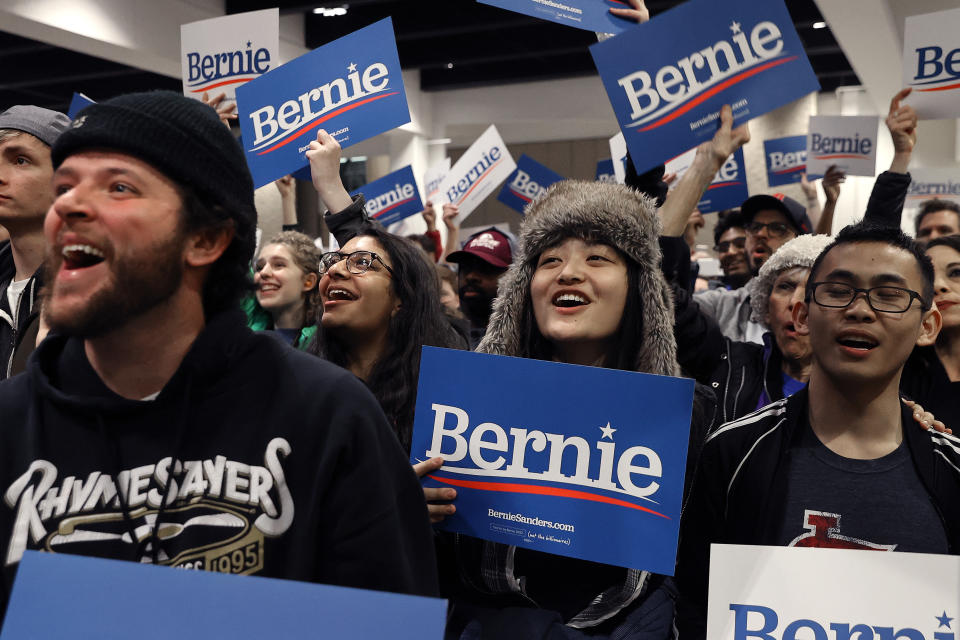Some Bernie Sanders supporters don’t know what they’re voting for
Sen. Bernie Sanders energizes his supporters with passionate demands for a remade society that does more for the working class. A central part of his vision is Medicare for all, a government-run health plan that would cover everybody and save millions of families from unaffordable medical bills.
In early-voting states, Sanders has gotten the largest portion of voters who support a single-payer health care plan such as Medicare for all. But many voters seem to be unclear about what that plan would do, especially regarding the employer-provided insurance that already covers some of them.
Polling by the Kaiser Family Foundation shows that more than half of people who support Medicare for all don’t realize it would eliminate private insurance. In a January survey, 59% of respondents who support Medicare for all said, incorrectly, that people with insurance through an employer would be able to keep it. That’s much larger than the 34% who said correctly there’d be no employer-provided insurance under Medicare for all.
By definition, Medicare for all would cover everybody, leaving no role for private insurers. Sanders wants a government plan to eliminate the profit motive in the private health insurance industry, so that the largest possible portion of funding goes toward care for patients rather than executive bonuses, stock buybacks, lobbying and frills. The whole point is to centralize health care under a single public agency and send private insurers packing.
Medicare for all immediately becomes less popular once people realize it would eliminate private insurance. Overall support for Medicare for all drops from 51% to 37% when pollsters tell respondents it would eliminate private insurance, while opposition jumps from 44% to 58%. The bottom line is that voters have a poor understanding of Medicare for all, and those who understand it best don’t like it.

To be fair, there’s a ton of confusion on the issue. Bernie Sanders and Elizabeth Warren both support Medicare for all, but Warren modified her view last fall by saying she’d also consider a more limited “public option” as a bridge to Medicare for all a few years down the road. A public option would leave private insurance in place but offer a new Medicare-like plan for people under 65 that would compete with private plans. Some voters may be confusing a public option with Medicare for all.
Joe Biden and Mike Bloomberg, the more centrist Democratic presidential candidates, also support a public option, with slight variations. And Democrats in Congress support nearly a dozen bills that would expand the government role in health care in many different ways. So clusters of Democrats back everything from modest changes to the U.S. health care system to a full government takeover.
For all the complaining about insurers and medical costs, most of the 150 million Americans who get coverage through an employer like what they have. In a 2019 Kaiser survey, 68% of people with such coverage rated it as excellent or good. Overall, 72% said they’re “grateful” for such coverage. Those are the folks who worry that losing private insurance could lead to lower-quality care and longer wait times, even if the government covered everything.
If voters are skeptical about something as radical as Medicare for all ever taking shape, they’re probably on the money. Congress can barely pass modest changes to anything. Republicans oppose virtually any health care legislation that would expand the role of government, and many Democrats would never vote for Medicare for all, either. It would take not just a Bernie Sanders presidency to enact socialized medicine, but also a complete liberal takeover of the moderate-to-conservative spectrum in Congress. If that’s what Sanders supporters are voting for, it’s wishful thinking.
Rick Newman is the author of four books, including “Rebounders: How Winners Pivot from Setback to Success.” Follow him on Twitter: @rickjnewman. Confidential tip line: [email protected]. Encrypted communication available. Click here to get Rick’s stories by email.
Read more:
Read the latest financial and business news from Yahoo Finance
Follow Yahoo Finance on Twitter, Facebook, Instagram, Flipboard, SmartNews, LinkedIn, YouTube, and reddit.
